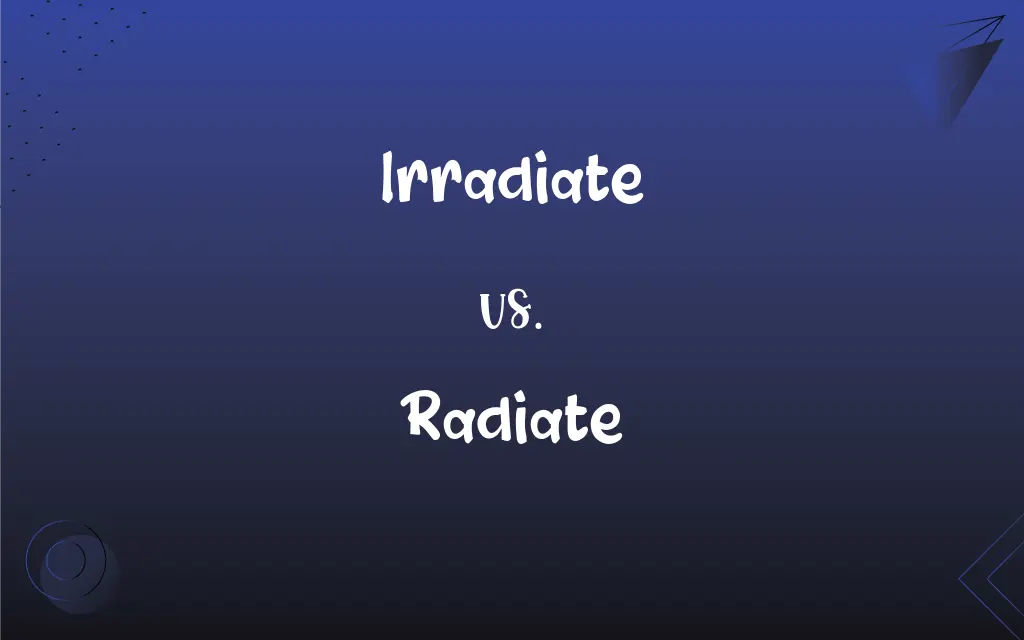Irradiate vs. Radiate: What's the Difference?
Edited by Harlon Moss || By Janet White || Updated on September 27, 2023
"Irradiate" means to expose to radiation, especially for medical or industrial purposes; "Radiate" means to emit energy, especially in the form of light or heat, or to spread out in all directions.

Key Differences
"Irradiate" and "Radiate" both pertain to the emission or exposure to some form of energy or rays, but their usage and context can vary distinctly. "Irradiate" primarily focuses on the act of exposing something to radiation. This exposure is typically deliberate and is often associated with medical treatments or industrial processes. For instance, food may be irradiated to kill bacteria, or a patient might undergo irradiation as part of cancer therapy. In contrast, "Radiate" is more generalized and can denote the emission of energy in various forms, such as light, heat, or even emotions.
While "Irradiate" tends to have specific and sometimes technical connotations, "Radiate" can be used in a wider array of contexts. A sun, for example, radiates light and heat, illuminating and warming our planet. Similarly, a person might be said to radiate happiness, signifying a visible or palpable emanation of joy or positivity. This gives "Radiate" a more versatile application compared to the specialized usage of "Irradiate."
In essence, "Irradiate" can be perceived as a subset of "Radiate." All things that are irradiated do radiate, but not everything that radiates is being irradiated. A light bulb radiates light when it's turned on, but it isn't being irradiated. On the flip side, when a material is irradiated in a lab, it might subsequently radiate certain types of energy due to that exposure.
"Irradiate" often implies a purposeful application or procedure, with the intent of achieving a particular outcome, such as sterilization or therapeutic benefit. "Radiate," however, might simply describe a natural or inherent quality, without a specific intent or purpose behind the emanation. For instance, a radiant smile isn't purposefully emitting light, but it does metaphorically shine with warmth and positivity.
Both words highlight the significance and impact of energy in different contexts. "Irradiate" reminds us of the power and potential risks of radiation when harnessed for specific purposes. "Radiate" underscores the omnipresence of energy in nature and in human experiences, spanning from the physical to the metaphorical.
ADVERTISEMENT
Comparison Chart
Basic Definition
To expose to radiation.
To emit energy or to spread out from a center.
Typical Usage
Medical, scientific, or industrial contexts.
Wide range of contexts, including nature and emotions.
Nature
Procedure or action.
Inherent quality or property.
Common Interpretations
Deliberate exposure for a specific outcome.
Natural or spontaneous emission of energy or qualities.
Emphasis
On the act of exposing to radiation.
On the act of emitting or the state of being spread out.
ADVERTISEMENT
Irradiate and Radiate Definitions
Irradiate
To shine or cast light upon something.
The lantern seemed to irradiate the entire cave.
Radiate
To emit energy or light.
The sun radiates warmth and light to the earth.
Irradiate
To expose to radiation for a specific purpose.
The fruits were irradiated to extend their shelf life.
Radiate
To project or glow with cheerfulness or joy.
She seemed to radiate happiness.
Irradiate
To treat with rays or radiation.
The tumor was irradiated using the latest technology.
Radiate
To emit in the form of rays or waves.
The antenna radiates signals.
Irradiate
To expose to radiation.
Radiate
To send out rays or waves.
Irradiate
To treat with radiation
Irradiate farm produce so as to destroy bacteria.
Radiate
To issue or emerge in rays or waves
Heat radiated from the stove.
Irradiate
To shed light on; illuminate.
Radiate
To extend in straight lines from or toward a center; diverge or converge like rays
Spokes radiate from a wheel hub.
Irradiate
To manifest in a manner suggesting the emission of light; radiate
Irradiate goodness.
Radiate
To spread into new habitats and thereby diverge or diversify. Used of a group of organisms.
Irradiate
To send forth rays; radiate.
Radiate
To emit (light or energy) in rays or waves.
Irradiate
To become radiant.
Radiate
To send or spread out from or as if from a center
A cactus that radiates spines.
Irradiate
To illuminate; to brighten; to shine light on.
Radiate
To irradiate or illuminate (an object).
Irradiate
To enlighten intellectually; to illuminate.
This book might irradiate your mind
Radiate
To manifest in a glowing manner
A leader who radiates confidence.
Irradiate
To animate by heat or light.
Radiate
(Botany) Having rays or raylike parts, as in the flower heads of daisies.
Irradiate
To radiate, shed, or diffuse.
Radiate
(Biology) Characterized by radial symmetry.
Irradiate
To decorate with shining ornaments.
Radiate
Surrounded with rays
A radiate head on a coin.
Irradiate
(intransitive) To emit rays; to shine.
Radiate
To extend, send or spread out from a center like radii.
Irradiate
(science) To apply radiation to. Category:en:Radioactivity
Radiate
(transitive) To emit rays or waves.
The stove radiates heat.
Irradiate
(medical) To treat (a tumour or cancerous growth) with radiation.
Radiate
(intransitive) To come out or proceed in rays or waves.
The heat radiates from a stove.
Irradiate
(transitive) To treat (food) with ionizing radiation in order to destroy bacteria.
Radiate
(transitive) To illuminate.
Irradiate
Illuminated; irradiated; made brilliant or splendid.
Radiate
To expose to ionizing radiation, such as by radiography.
Irradiate
To throw rays of light upon; to illuminate; to brighten; to adorn with luster.
Thy smile irradiates yon blue fields.
Radiate
(transitive) To manifest oneself in a glowing manner.
Irradiate
To enlighten intellectually; to illuminate; as, to irradiate the mind.
Radiate
(ecology, intransitive) to spread into new habitats, migrate.
Irradiate
To animate by heat or light.
Radiate
Radiating from a center; having rays or parts diverging from a center; radiated.
A radiate crystal
Irradiate
To radiate, shed, or diffuse.
A splendid faÇade, . . . irradiating hospitality.
Radiate
Surrounded by rays, such as the head of a saint in a religious picture.
Irradiate
To expose to radiation of any kind, especially ionizing radiation; as, to sterilize food by irradiating it with gamma rays; one can cause mutations in bacteria by irradiating them with ultraviolet light.
Radiate
(botany) Having parts radiating from the center, like the petals in many flowers.
Irradiate
To emit rays; to shine.
Radiate
(botany) Consisting of a disc in which the florets are tubular.
Irradiate
Illuminated; irradiated.
Radiate
(biology) Having radial symmetry, like a seastar.
Irradiate
Give spiritual insight to; in religion
Radiate
(zoology) Belonging to the Radiata.
Irradiate
Cast rays of light upon
Radiate
(zoology) One of the Radiata.
Irradiate
Expose to radiation;
Irradiate food
Radiate
To emit rays; to be radiant; to shine.
Virtues shine more clearIn them [kings], and radiate like the sun at noon.
Irradiate
To make clear or bright by lighting up.
Her wisdom seemed to irradiate the room.
Radiate
To proceed in direct lines from a point or surface; to issue in rays, as light or heat.
Light radiates from luminous bodies directly to our eyes.
Irradiate
To affect or treat by exposure to radiant energy.
Scientists irradiate certain materials to study their properties.
Radiate
To emit or send out in direct lines from a point or points; as, to radiate heat.
Radiate
To enlighten; to illuminate; to shed light or brightness on; to irradiate.
Radiate
Having rays or parts diverging from a center; radiated; as, a radiate crystal.
Radiate
Having in a capitulum large ray florets which are unlike the disk florets, as in the aster, daisy, etc.
Radiate
Belonging to the Radiata.
Radiate
One of the Radiata.
Radiate
Send out rays or waves;
The sun radiates heat
Radiate
Send out real or metaphoric rays;
She radiates happiness
Radiate
Extend or spread outward from a center or focus or inward towards a center;
Spokes radiate from the hub of the wheel
This plants radiates spines in all directions
Radiate
Especially of the complexion: show a strong bright color, such as red or pink;
Her face glowed when she came out of the sauna
Radiate
Cause to be seen by emitting light as if in rays;
The sun is radiating
Radiate
Experience a feeling of well-being or happiness, as from good health or an intense emotion;
She was beaming with joy
Her face radiated with happiness
Radiate
Issue or emerge in rays or waves;
Heat radiated from the metal box
Radiate
Spread into new habitats and produce variety or variegate;
The plants on this island diversified
Radiate
To extend, spread, or move in all directions from a center.
The town's streets radiate from the central square.
Radiate
To display emanating light or energy.
The gem appeared to radiate a soft glow.
FAQs
Can "Radiate" refer to physical structures?
Yes, like roads radiating from a central point in a city.
Can "Radiate" be used metaphorically?
Yes, e.g., someone can radiate confidence or joy.
Can "Radiate" refer to emotions?
Yes, someone can be said to radiate happiness or positivity.
Does "Irradiate" always relate to harmful radiation?
No, irradiation can be beneficial, such as in medical treatments or food sterilization.
Does "Radiate" only mean emitting light?
No, it can refer to emitting heat, sound, or even emotions.
Can objects radiate cold?
Objects can radiate heat away, making them feel cold, but they don't emit "cold" as an energy.
Is irradiated food radioactive?
No, irradiating food kills pathogens but doesn't make the food radioactive.
Can you irradiate a room?
Technically yes, but the term usually pertains to specific objects or materials, not large spaces.
Does "Irradiate" imply a temporary or permanent change?
It depends on the context; some effects can be temporary, while others might be permanent.
Do all irradiated objects radiate energy afterward?
Not necessarily, but some might emit energy due to the irradiation process.
Why do we irradiate certain foods?
To kill bacteria, parasites, and pests, increasing shelf life and safety.
Is the radiation from a radiating object always visible?
No, objects can radiate invisible forms of energy like infrared or ultraviolet light.
Is irradiation always man-made?
No, natural sources like cosmic rays can also irradiate objects.
Does "Radiate" imply a single direction?
No, it often implies spreading out in multiple or all directions.
Are "Irradiate" and "Radiate" synonyms?
No, while related, they have different nuances and specific contexts of use.
About Author
Written by
Janet WhiteJanet White has been an esteemed writer and blogger for Difference Wiki. Holding a Master's degree in Science and Medical Journalism from the prestigious Boston University, she has consistently demonstrated her expertise and passion for her field. When she's not immersed in her work, Janet relishes her time exercising, delving into a good book, and cherishing moments with friends and family.
Edited by
Harlon MossHarlon is a seasoned quality moderator and accomplished content writer for Difference Wiki. An alumnus of the prestigious University of California, he earned his degree in Computer Science. Leveraging his academic background, Harlon brings a meticulous and informed perspective to his work, ensuring content accuracy and excellence.































































